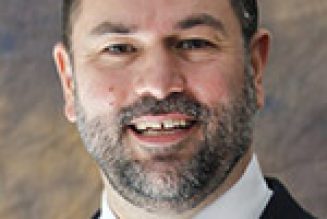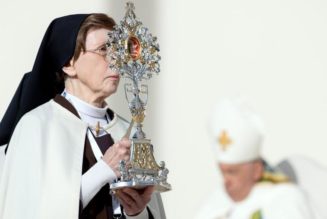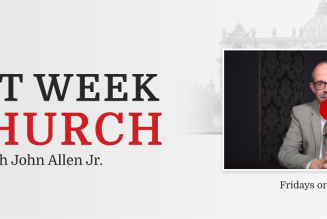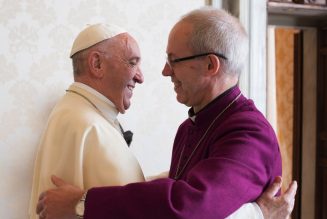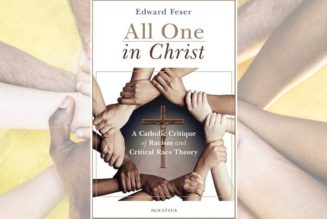
What I call the Straw Pope Fallacy is a variation of the famous Straw Man Fallacy that is applied to the pope.
The Straw Man Fallacy occurs when a person critiques an inaccurate version of someone’s position.
The name of the fallacy is based on the fact that it’s easier to knock down a straw man than a real man.
Thus, critics of a position are often tempted to try to knock down a false version of a position (a “straw man”) rather than tackling the position itself (the “real man” in the metaphor).
When a critic proposes an inaccurate version of the position he wants to disprove, it’s referred to as “setting up a straw man.”
An Example: Baptism & Salvation
Most Christians (e.g., people in the Catholic, Orthodox, Coptic, Assyrian, Lutheran, Anglican, Methodist, Presbyterian, and Church of Christ communities) hold that God uses water baptism as a means of communicating his saving grace to people by the power of Christ’s resurrection.
A critic might respond, “That’s clearly untrue. The physical action of water only removes dirt from the body. It doesn’t do anything with respect to salvation.”
The critic has just committed the Straw Man Fallacy, because the claim wasn’t that the physical action of water brings about salvation.
Instead, the claim is that God uses water baptism as a means by which he gives salvation through the power of Christ’s resurrection.
If you want to disprove belief in baptismal salvation, that’s the claim you need to knock down—not a parallel claim that the physical action of the water itself saves us.
The first pope—St. Peter—warned against this misunderstanding.
So did Martin Luther. In his Short Catechism, he writes:
How can water do such great things?
Answer: It is not the water indeed that does them, but the word of God which is in and with the water, and faith, which trusts such word of God in the water. For without the word of God the water is simple water and no baptism. But with the word of God it is a baptism, that is, a gracious water of life and a washing of regeneration in the Holy Ghost.
Setting Up a Straw Pope
It’s common—and understandable—for non-Catholics to misunderstand what the Catholic Church does and doesn’t claim about the pope.
As a result, it’s easy for them to set up straw popes—i.e., to propose inaccurate versions of Catholic teaching about the role and function of the pope.
This also can happen because some Catholics aren’t as educated in their faith as they should be, don’t fully grasp Church teaching, and make exaggerated claims.
For whatever cause, straw popes are common in apologetic discussions.
Infallibility vs. Sinful Popes
A classic example involves a confusion about the pope’s ability to teach infallibly.
This is often misunderstood as implying that popes can’t sin.
Critics will then point to examples of popes who have done things they regard as sinful and conclude that Catholic teaching about the pope can’t be true.
This is an example of the Straw Pope Fallacy because the Church does not claim that popes can’t sin.
The inability to sin is a gift known as impeccability, and it’s not the same thing as the ability to engage the Church’s gift of infallibility when teaching.
The latter will result in teaching that does not contain error, but it doesn’t mean that a pope will never sin.
In fact, the Church freely acknowledges that popes can sin. They have since the very beginning! St. Peter denied Christ three times!
Yet that didn’t stop Jesus from reaffirming him in his pastoral office with respect to the other disciples. Neither did it stop Peter from writing two inspired—and thus infallible—encyclical letters. (You can read the first here; and the second here.)
It’s thus knocking down a straw pope to point to individual popes who’ve done things you regard as sinful and claim this disproves Catholic teaching.
It doesn’t. The Church doesn’t teach that popes are sinless.
Perfect Prudence?
Sometimes the Straw Pope Fallacy involves an even more expansive idea than popes being impeccable.
Some critics cite what they take to be examples of doing things that are merely ill advised or imprudent as somehow violating Catholic teaching regarding the papacy.
That would be the case if the Church taught that popes are perfectly prudent and can’t make mistakes of a prudential nature.
However, the Church claims no such thing. There is nothing in Church teaching that says this won’t happen.
It thus would be erecting a straw pope to claim that it does.
Divine Guidance?
But perhaps we can find a way to improve this argument, for the Church does claim that the Holy Spirit provides guidance to the pope and the bishops as members of the Magisterium.
That God gives people divine guidance of some form—even to Christians that are not members of the Magisterium—is certainly true. St. James says so (Jas. 1:5).
Calvinists would presumably see John Calvin as a person to whom God gave special guidance, resulting in him having a particularly insightful theology. Lutherans would presumably do the same for Martin Luther, and Wesleyans for John Wesley.
And the Church acknowledges that God gives this guidance to bishops, including the pope, in a special way.
But this guidance is separate from the gift of infallibility. If infallibility is engaged, the resulting teaching is guaranteed to be free from error.
However, the more general guidance God gives is not guaranteed to have this result—whether it’s the general guidance he gives to individual Christians, to gifted theologians, or to representatives of the Magisterium, like the bishops and popes.
The Church does not teach that, when operating under general guidance, the members of the Magisterium can’t make mistakes—and certainly not in the prudential order. In fact, it teaches:
When it comes to the question of interventions in the prudential order, it could happen that some magisterial documents might not be free from all deficiencies. Bishops and their advisors have not always taken into immediate consideration every aspect or the entire complexity of a question.
But it would be contrary to the truth, if, proceeding from some particular cases, one were to conclude that the Church’s Magisterium can be habitually mistaken in its prudential judgments, or that it does not enjoy divine assistance in the integral [i.e., overall] exercise of its mission (CDF, Donum Veritatis 24).
Here the topic is magisterial interventions of a prudential nature—that is, when the Church teaches on a prudential matter. This is not the same thing as the prudence of policy and administrative decisions, like whether to sign a treaty or who to appoint to a particular office.
On the level of decisions about what to teach on prudential matters, the Church acknowledges that the Holy Spirit guides the Magisterium so that it is not “habitually mistaken,” but that doesn’t mean this guidance prevents all mistakes, for “it could happen that some magisterial documents might not be free from all deficiencies.”
If that’s the case even when the Church is exercising its teaching authority, it’s even more the case when it comes to non-doctrinal decisions, such as international relations or personnel matters.
To truly engage with what the Church teaches regarding the guidance of the Magisterium, one would need to demonstrate that the Church is “habitually mistaken” in its prudential judgments (at least on doctrinal matters) and thus that it doesn’t enjoy the kind of divine guidance it claims.
That will be difficult to do since the Catholic Church is the world’s largest religious body—a fact that suggests they’ve been doing something right.
What About the Pope Himself?
The above discussion involves the guidance that the Holy Spirit gives to the Magisterium as a whole—that is, the bishops teaching in union with the pope—but could we configure a version of the argument that would be more specific to the pope himself?
We could, if the Church taught that the guidance that God gives the pope is sufficiently strong that it prevents him from making mistakes in the prudential order.
However, the Church does not teach this. Although the Holy Spirit offers guidance to the Church in selecting a new pope, this guidance doesn’t guarantee that the choice of pope will be a good one!
In a 1997 interview, Joseph Ratzinger (the future Pope Benedict XVI) was asked whether the Holy Spirit is responsible for the election of a pope. He replied:
I would not say so, in the sense that the Holy Spirit picks out the pope. . . . I would say that the Spirit does not exactly take control of the affair, but rather like a good educator, as it were, leaves us much space, much freedom, without entirely abandoning us.
Thus the Spirit’s role should be understood in a much more elastic sense, not that he dictates the candidate for whom one must vote. Probably the only assurance he offers is that the thing cannot be totally ruined (John Allen, The Rise of Benedict XVI, 6).
He continued:
There are too many contrary instances of popes the Holy Spirit obviously would not have picked!
It’s thus quite possible for there to be bad popes, as history has illustrated.
Protestant apologist James White has recently been proposing the idea of a debate on the merits of recent statements or actions by Pope Francis and what implications they may have for Catholic teachings about the pope.
But even if one were to conclude that Francis was a bad or unsuitable pope, that would not disprove Catholic teaching, because Catholic teaching allows there to be bad popes.
It would be erecting a straw pope to suppose otherwise.
The most you could infer from the conclusion that Francis is a bad pope would be that he’s an outlier.
You wouldn’t be showing from this single data point that the Holy Spirit doesn’t guide the overall institution of the papacy or that he doesn’t work through bad popes.
After all, the Holy Spirit provided guidance to the overall institution of the Jewish high priesthood, but that didn’t stop there from being bad high priests—like Caiaphas—who plotted Jesus’ death.
Nor did it mean that God wouldn’t work through bad high priests once they had assumed their divinely instituted office. In fact, the Holy Spirit gave a genuine prophecy through Caiaphas even when he was in the act of plotting the death of the Messiah (John 11:47-53)!
Once again, you’d need to argue against the whole line of popes and show that they—as a body—lack the guidance that the Church holds they receive by virtue of their office.
You could do that by arguing that they systematically teach false doctrine—in which case you need to debate the doctrines.
However, if you want to do it by pointing to poor prudential decisions, you’ll have a hard row to hoe, because—once again—the Catholic Church is the largest religious body in the world, making it difficult to hold that popes are “habitually mistaken” in their prudential decisions. They’re obviously doing something right!
Appointing Officials?
As part of his argument for debating recent actions by Pope Francis, White says:
I think I’ve made a very strong case that we live at a point in time, right now, where there needs to be a clear discussion of the positive claims that Rome makes concerning the necessity of the papacy—and not just the papacy as some nebulous, unidentifiable, foggy chimera.
But you have a pope, and that pope has a worldview. And he is using that worldview to choose cardinals and bishops, scholars on the Pontifical Biblical Commission, that will influence the teaching in Roman Catholic schools for decades.
You know this to be true. This needs to be debated.
And if you’re going to debate sola scriptura, then both ultimate claims of an epistemological authority must be on the table. It is time for Roman Catholic apologists to stand up to their own claims.
White thus sees the pope’s appointment of cardinals, bishops, and biblical scholars as relevant to the question of whether Catholic teaching on the papacy is true.
Why would these be relevant?
Further light is shed on this question at another point in the video, where he says:
The worldview that allows Francis to look at the tradition, primarily delivered to him in the South American church, and interpret it the way he’s interpreting it, and then acting upon that—in putting people in positions of authority—results in the papacy teaching something differently now than it did in the past.
The concept of infallible teaching authority has to have meaning. Or your claims, and my claims, are empty.
White here relates the appointment of various individuals as somehow affecting “the concept of infallible teaching authority.”
His argument seems to be that Pope Francis has a worldview that leads him to appoint officials that will have an influence on Catholic teaching that will result in it changing in some way. He also said:
I remember very, very clearly pointing out a contradiction—this is back during John Paul II—a contradiction between what John Paul II had said, and [what] a previous bishop of Rome had said.
White thus takes differences in Church teaching over time—such as the one he remembers finding between John Paul II and a prior pope, or the ones he thinks Francis’s appointees might one day produce—as contradicting “the concept of infallible teaching authority.”
No Doctrinal Development?
I have to have some sympathy for White, because there are a large number of Catholics who say things like “[Catholic] Doctrine can’t change.”
As I point out in my book Teaching With Authority, the Church does not use this language.
Instead, it acknowledges that doctrinal development happens over time:
In order to serve the People of God as well as possible, in particular, by warning them of dangerous opinions which could lead to error, the Magisterium can intervene in questions under discussion which involve, in addition to solid principles, certain contingent and conjectural elements. It often only becomes possible with the passage of time to distinguish between what is necessary and what is contingent.
The willingness to submit loyally to the teaching of the Magisterium on matters per se not [infallible] must be the rule. It can happen, however, that a theologian may, according to the case, raise questions regarding the timeliness, the form, or even the contents of magisterial interventions. Here the theologian will need, first of all, to assess accurately the authoritativeness of the interventions which becomes clear from the nature of the documents, the insistence with which a teaching is repeated, and the very way in which it is expressed. . . .
In fact, the theologian, who cannot pursue his discipline well without a certain competence in history, is aware of the filtering which occurs with the passage of time. This is not to be understood in the sense of a relativization of the tenets of the faith. The theologian knows that some judgments of the Magisterium could be justified at the time in which they were made, because while the pronouncements contained true assertions and others which were not sure, both types were inextricably connected. Only time has permitted discernment and, after deeper study, the attainment of true doctrinal progress (CDF, Donum Veritatis 24).
The Church thus acknowledges that, as it seeks to articulate Christian doctrine, its statements have varying levels of authority.
As long as these are not on the infallible level, they can contain both “solid principles” that are “necessary,” as well as “certain contingent and conjectural elements,” and that “it often only becomes possible with the passage of time to distinguish” between them.
This process, which occurs under the guidance of the Holy Spirit, is referred to as doctrinal development.
Therefore, it is possible in particular situations to consider non-infallible teachings and “raise questions regarding the timeliness, the form, or even the contents of magisterial interventions.”
Which is to say: Non-infallible teachings are not infallible.
They have differing levels of authority, from the tentative to the very firm, and their overall reliability is found in the guidance that the Holy Spirit gives the Church even when infallibility isn’t being invoked. But they can contain “contingent and conjectural elements” that will be removed over the course of time as the Holy Spirit guides the Church “into all the truth” (John 16:13).
Therefore, one erects a straw pope if one proposes that no imperfections and no doctrinal development can occur.
This seems to be what James White is doing, because merely finding a difference between what John Paul II said and what a prior pope said does not engage “the concept of infallible teaching authority”—with one possible exception.
The Real Issue
The one exception occurs if you can find:
- A papal teaching that is infallible,
- A Church teaching that is infallible (whether by a pope or the Magisterium in general), and
- Both of these teachings contradict each other.
If you could find such a situation, then you would have a disproof of papal infallibility by counter-example, which is one of two strategies one could employ (the other would be a disproof of the doctrine on the level of principle rather than by example).
Consequently, this is the real issue for example-based disproofs of papal infallibility. Everything else is a distraction that involves setting up a straw pope.
It does not matter if:
- A pope commits sins
- A pope does imprudent things
- A pope is a bad pope
- A pope says something different than what has been said in the past
To disprove papal infallibility by counter-example you need an infallible papal teaching that contradicts another infallible teaching.
Nothing else will do the job.
I’ve already explained why I’m not interested in debating statements or actions by Pope Francis for various practical reasons.
However, the above explains why on the doctrinal level: Pope Francis has never attempted to teach infallibility on a matter of doctrine, and therefore the relevant issue is not on the table. Such a debate would, of necessity, be an exercise in irrelevance.
Which is what the Straw Pope and the Straw Man fallacies are—fallacies of relevance.
To actually do this kind of disproof, you’d need to comb through the list of papal documents that contain infallible definitions (and, as I point out in Teaching With Authority, the list is quite small) and then find a contradiction to another infallible teaching.
But . . . ! But . . . !
The above will not be satisfying to many critics of the Catholic Church, because it makes their job much harder than it otherwise would be.
It’s one thing to argue that a pope sins, does imprudent things, is bad at his job, or says something different than prior popes.
It’s another thing entirely to find contradictions between items in the relatively modest body of infallible teachings.
Some may argue that they ought to be able to appeal to these other things—that the papacy should work the way they want it to.
And one can have some sympathy for them, as individual Catholics sometimes make exaggerated claims that would support a more expansive view of how it works.
But the fact is that the Church does not teach such a view. The Church teaches that the Holy Spirit provides the Magisterium guidance that guarantees the reliability of its teachings in a general fashion, but he only guarantees the complete reliability of specific teachings when they are taught infallibly.
Consequently, if you want to disprove infallibility, it’s to that set of teachings you must appeal.
You can’t disprove infallibility by appealing to non-infallible teachings (or things that aren’t even teachings).
You can say that the Church should teach something else about the papacy—something that’s easier for you to knock down.
But that’s the definition of attacking a straw man—or, in this case, a straw pope.
Join Our Telegram Group : Salvation & Prosperity

